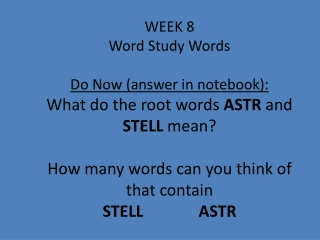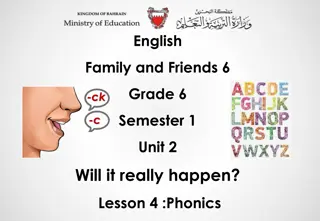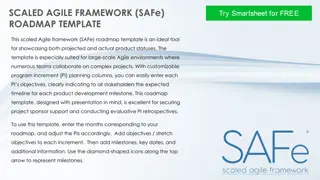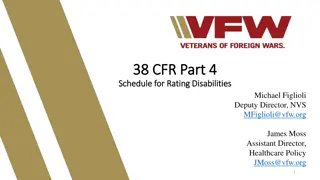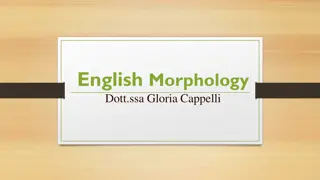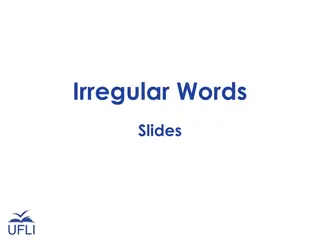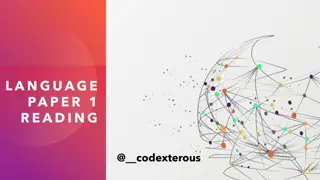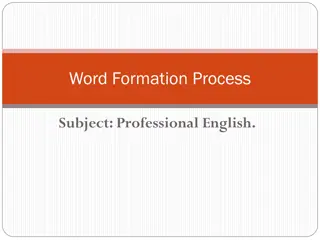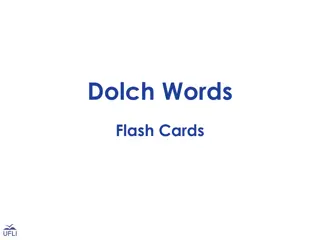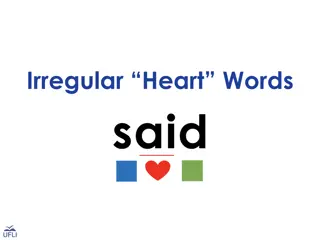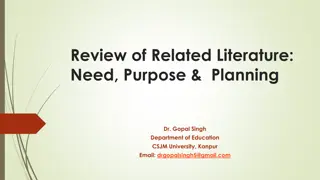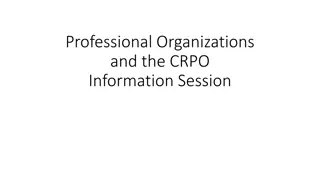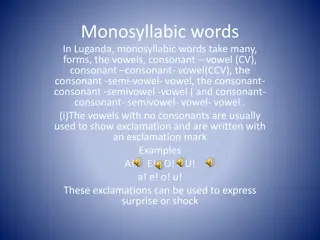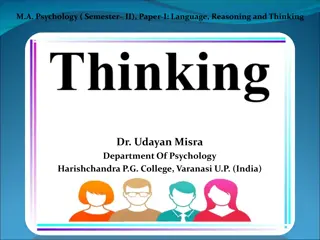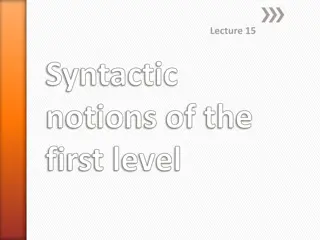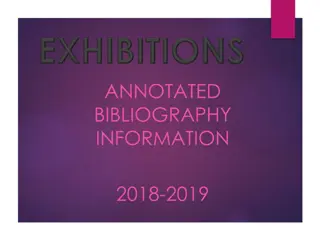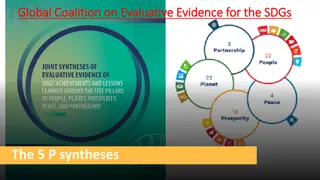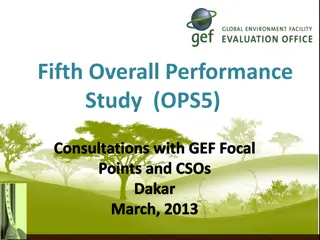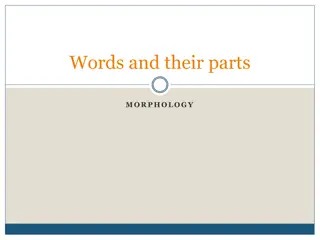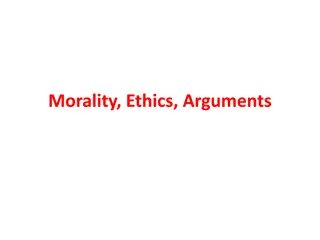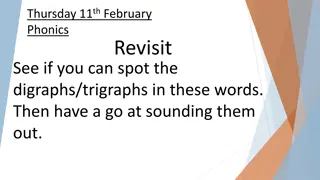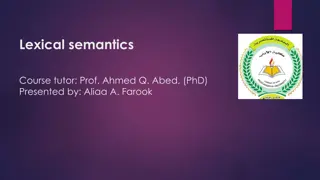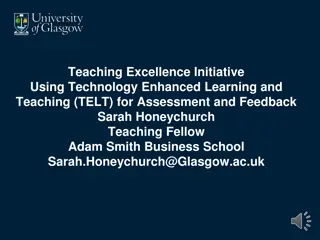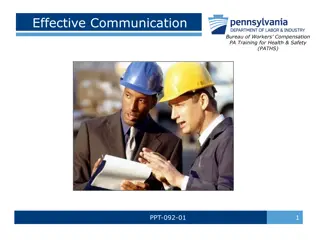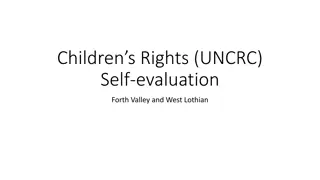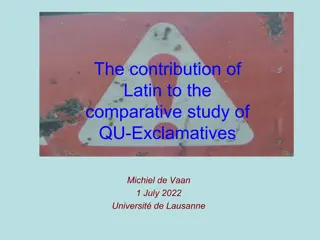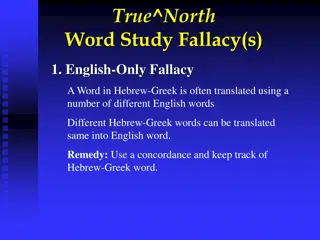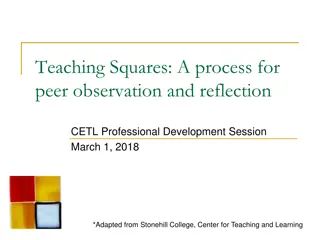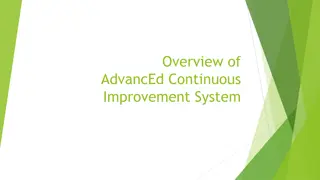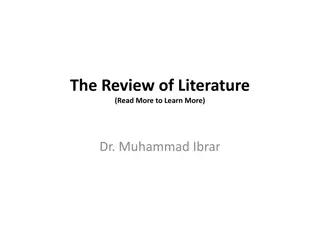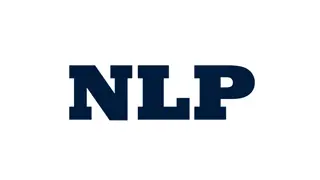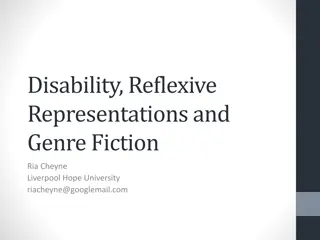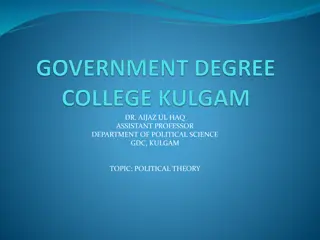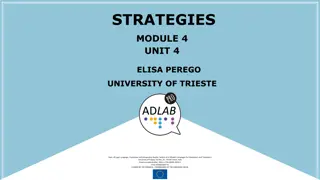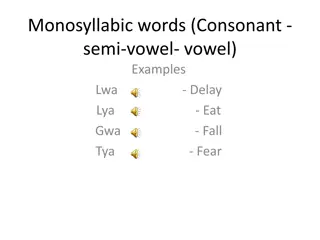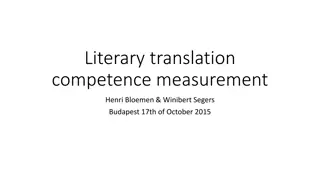Explore Root Words ASTR and STELL
Uncover the meanings of the root words ASTR and STELL through words like astronomy, asteroid, stellar, and more. Delve into the world of stars and star-like objects through words that are rooted in ASTR and STELL.
34 views • 14 slides
Phonics Lesson for Grade 6: Words ending with "-ck" and "-c
This lesson focuses on identifying and spelling words ending with "-ck" and "-c," as well as using them accurately in sentences. Students will practice words like duck, picnic, music, neck, plastic, comic, rock, and clock. Activities include completing words with "c" or "ck," practicing spelling, an
1 views • 9 slides
SAFe Roadmap Template for Large-Scale Agile Environments
This SAFe roadmap template is designed for showcasing projected and actual product statuses in large-scale Agile environments. It features customizable Program Increment planning columns to indicate objectives, timelines, milestones, and additional details. Ideal for securing project sponsor support
2 views • 4 slides
Overview of 38 CFR Part 4 Rating Schedule
This class provides a general overview of 38 CFR Part 4, covering essential aspects such as evaluative rating, resolution of reasonable doubt, evaluation of evidence, and principles for assigning disability ratings. It emphasizes the importance of accurate medical exams and understanding rating perc
0 views • 84 slides
Understanding English Morphology: The Study of Words and Meaning
English Morphology delves into the structure of words, exploring morphemes as the building blocks of linguistic meaning. From free morphemes like "certain" to bound morphemes like "-ly," the discipline uncovers how words are constructed and adapted grammatically. By examining the derivational and in
0 views • 49 slides
Irregular Words: Learn and Review Commonly Used Words
This text provides a list of irregular words commonly used in English. It includes words like "the," "has," "were," and "know." Practice and remember these words to improve your vocabulary and language skills.
0 views • 169 slides
Examining Language and Structure in GCSE English Language Preparation
Exploring the effective preparation strategies for GCSE English Language through language and structural analysis. Techniques for shaping meaning using evaluative words, image interpretation, and identifying key structural moments in texts are discussed and exemplified.
1 views • 14 slides
Various Word Formation Processes in Professional English
Coinage, Borrowing, Compounding, Derivation, Blending, Backformation, and Acronym are key mechanisms for forming new words in Professional English. Coinage involves inventing new words, Borrowing uses words from foreign languages, Compounding combines words to create new ones, Derivation adds prefix
0 views • 11 slides
Dolch Words Flash Cards: Pre-Primer Level Vocabulary
Explore a collection of Dolch words flashcards, including common words like "the," "to," "and," "a," and more. These vibrant images provide an engaging way to learn and practice essential pre-primer level vocabulary words. Enhance your reading and language skills with this visual learning resource.
0 views • 226 slides
Understanding Irregular Heart Words in Teaching
Exploring the concept of irregular heart words in teaching where common words present challenges due to irregularities in letter-sound correspondences. Learn how to help students decode and master these irregular words effectively through targeted activities and teaching tips.
0 views • 181 slides
Understanding Literature Reviews: Process, Purpose, and Types
A literature review is an essential part of academic research, providing a synthesis of existing studies on a topic. It involves reviewing published information within a specific subject area to help the reader understand the research background. The process of conducting a literature review is meti
0 views • 70 slides
Professional Organizations and the CRPO Information Session
Professional organizations like AAMFT, CAMFT, and OAMFT play a crucial role in protecting providers, offering services, and providing training at better rates for Marriage and Family Therapists and healthcare providers. The American Association for Marriage and Family Therapy (AAMFT) is a prominent
0 views • 61 slides
Understanding Monosyllabic Words in Luganda
Monosyllabic words in Luganda come in various forms, including vowels as exclamations or questions, consonant-vowel words with complete meanings, nasal-consonant-vowel words, double consonant-vowel words, and more. These words play different roles in expressing surprise, asking questions, or conveyi
0 views • 8 slides
Understanding Different Types of Thinking in Psychology
Thinking is a complex mental process that involves manipulation of information to find solutions or make decisions. This process includes concepts, propositions, and images and can be goal-oriented and influenced by past experiences. Different types of thinking include Autistic, Realistic, Convergen
1 views • 10 slides
Syntactic Notions of the First Level in Linguistics
In this lecture, the syntactic notions of the first level in linguistics are discussed, focusing on word groups, simple sentences, and the essential features of actual division. The different types of syntagmatic groupings of words, such as notional words, functional words, and their combinations, a
1 views • 19 slides
Understanding Annotated Bibliographies: A Comprehensive Guide
An annotated bibliography is a curated list of citations to various sources followed by descriptive and evaluative paragraphs, providing insight into the relevance, accuracy, and quality of each source. It serves as a valuable tool for researchers to organize, evaluate, and document their sources ef
0 views • 13 slides
Global Coalition on Evaluative Evidence for the SDGs
The Global Coalition on Evaluative Evidence for the SDGs aims to synthesize existing data to accelerate SDG achievements by providing insights, analysis, and policy recommendations. It focuses on evaluating the progress towards the SDGs, identifying barriers, and suggesting ways to achieve the goals
0 views • 8 slides
Evaluating GEF's Performance and Impact through OPS5 Consultations
The OPS5 consultations in Dakar, March 2013 aimed to assess the GEF's effectiveness in achieving its objectives, identify potential improvements, and integrate evaluative evidence across various streams including country portfolio evaluations and thematic evaluations. The study also focused on refin
2 views • 20 slides
Understanding Words and Their Parts in Morphology
Explore the world of words and their parts in morphology through exercises, classifications of word classes, differentiation between content words and function words, analysis of words beginning with "b," homonyms, polysemy, and verb inflection. Delve into the various aspects of linguistics to enhan
0 views • 49 slides
Understanding Morality, Ethics, and Arguments in Philosophy
Morality and ethics are interconnected concepts that delve into the principles of right and wrong conduct. They involve disciplined reflection on human moral intuitions and choices. Valid and invalid moral arguments exemplify the importance of drawing evaluative conclusions from facts. Various ethic
0 views • 9 slides
Combatting Kidney Disease in Children: Importance of Early Detection and Education
Kidney disease affects millions worldwide, including children at risk from an early age. Encouraging education, early detection, and a healthy lifestyle is crucial to combat preventable kidney diseases. Various disorders like Vesicoureteral Reflux (VUR) and UTIs pose significant challenges, emphasiz
0 views • 11 slides
Phonics Revisit: Digraphs and Tricky Words Practice
Explore digraphs and trigraphs in words like "growl," "frown," "spear," and practice sounding out tricky words such as "come," "they," and "when." Learn about the sounds "ei" and "eigh" making the "ay sound" and practice spelling words like "eight," "eighty," and "neighbour." Test your memory with a
0 views • 9 slides
Understanding Lexical Semantics: An Overview
Lexical semantics explores the relationships words have with each other and with our understanding of reality. It delves into reference and sense, naming theory, synonymy, and more. Reference focuses on how words relate to objects, while sense deals with relationships between lexical items. Naming t
0 views • 10 slides
Using Technology for Assessment and Feedback in Teaching Excellence Initiative
Self-regulated learners in higher education benefit from active involvement in assessment and feedback processes, leading to deeper learning. Good assessment and feedback practices promote self-regulation by engaging students in setting goals, making evaluative decisions, generating feedback, and re
0 views • 6 slides
Effective Communication in Workplace Safety Training
This presentation covers the importance of effective communication in workplace safety training, emphasizing the elements of a communication plan, communication processes, and the realities of communication. It explores the consequences of failure to communicate safety information effectively and di
1 views • 31 slides
Children's Rights (UNCRC) Self-evaluation Resource for Educational Settings
Introduction of the UNCRC incorporation into Scots law and its implications for educational settings. Designed to provide evaluative statements, examples, and prompts for understanding and implementing children's rights in practice. Includes guidance on using the resource and navigation through 5 se
0 views • 108 slides
Latin's Contribution to Comparative Study of QU-Exclamatives
The study explores the role of Latin in examining QU-Exclamatives, evaluative phrases introduced by an exclamative word. It delves into the syntax, origins, and examples of QU-exclamatives in various languages like French, Albanian, and Old English.
0 views • 22 slides
Effective Strategies for Word Study in Text Analysis
Explore common fallacies in word study such as the English-Only Fallacy, Root Fallacy, Time-Frame Fallacy, and Over-load Fallacy. Learn how to overcome these fallacies by giving context priority and using concordances. Discover practical steps to choose words for study, including looking for critica
0 views • 7 slides
Insights into Wellbeing and Policy: Aotearoa's Approach
Explore Aotearoa's unique approach to wellbeing and policy through He Ara Waiora, emphasizing Maori knowledge and perspectives. This indigenous framework focuses on interconnected aspects of waiora, including Wairua (spirit), Te Taiao (the natural world), and Te Ira Tangata (the human domain). It pr
0 views • 14 slides
Peer Observation and Reflection in Teaching Squares
Teaching Squares is a collaborative process for reciprocal peer observation and reflection in the context of professional development. It involves non-evaluative steps such as an initial meeting, three classroom visits, and a square share discussion. Best practices include creating cross-disciplinar
0 views • 6 slides
Transforming Education Through AdvancEd Continuous Improvement System
Explore the journey of education and accreditation as ongoing processes, supported by AdvancEd Performance Standards and Continuous Improvement System. Learn about the tools, resources, and technology platforms provided to institutions for evaluating and driving institutional transformation. Discove
1 views • 13 slides
Analyzing Links Between Social Exclusion and Health in Scotland
Analyzing the relationship between social exclusion and health in Scotland, this task requires drawing conclusions based on evidence from multiple sources. Examples provided demonstrate how social exclusion impacts health outcomes, with varying levels of evaluative language and synthesis between sou
0 views • 17 slides
Understanding Types and Purpose of Literature Reviews in Research
Literature review plays a crucial role in research by summarizing existing knowledge, theories, methodologies, and research gaps. Types include Evaluative, Exploratory, and Instrumental reviews, each serving a unique purpose. The main objective is to convey previous findings and establish a strong f
0 views • 15 slides
Overview of NLP Word Distributions and Stop Words
Introduction to NLP discusses how words are not evenly distributed using examples like the 80/20 rule. The distribution of words in Shakespeare's "Romeo and Juliet" is highlighted, showing common word frequencies. Additionally, Stop Words Fact explains how common English words dominate text composit
0 views • 14 slides
Disability, Reflexive Representations in Genre Fiction: Exploring Cultural Perspectives
Disability studies, a vital academic discipline, delves into societal perceptions and policies around disability, challenging norms through evaluative and positive-image approaches. This exploration includes cultural analysis, critical assessments, and nuanced representations in genre fiction, offer
0 views • 18 slides
Understanding Job Performance and its Determinants
Job performance encompasses what employees do and the results they achieve, often influenced by factors beyond their control. Productivity, evaluative nature, and multidimensional aspects characterize performance evaluation. Performance is determined by declarative knowledge, procedural knowledge, a
0 views • 14 slides
Understanding Political Theory: Definitions, Differences, and Significance
Political theory encompasses systematic explanations of political phenomena, distinct from political thought which involves ideas and opinions of philosophers. It constitutes both political science and philosophy, addressing both empirical and evaluative aspects. The significance lies in finding sol
0 views • 7 slides
Effective Strategies for Creating Engaging Advertisements
Discover effective strategies for formulating engaging advertisements, such as observational skills, writing skills, and concise language use. Explore the use of meticulous, visually intense, and usable content to captivate audiences in the realm of visual arts and museum advertisements. Learn about
0 views • 17 slides
Exploring Monosyllabic and Polysyllabic Words in Luganda
Discover the structure of monosyllabic words in Luganda consisting of consonant-semi-vowel-vowel patterns like Lwa and Gwa, as well as those with consonant-consonant-semi-vowel-vowel patterns like Mbwa and Nswa. Further explore the realm of polysyllabic words in Luganda, where each syllable ends wit
0 views • 4 slides
Understanding Competence Measurement in Literary Translation
Exploring the concept of competence measurement in literary translation, this text delves into the ELV competence model, a five-step scheme for measurement, reliability versus validity, and the relationship between competence measurement and translation product evaluation. It discusses the importanc
0 views • 18 slides
